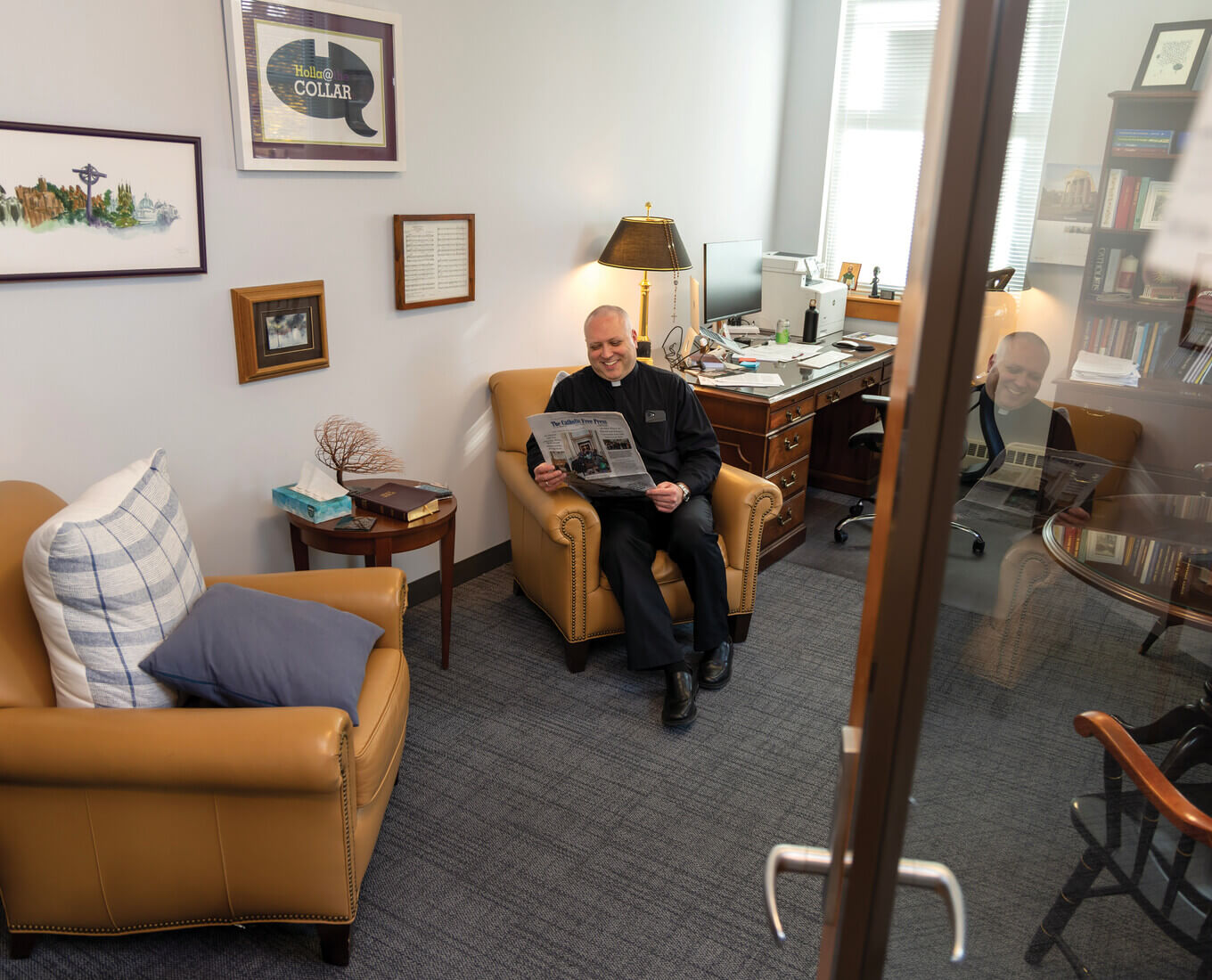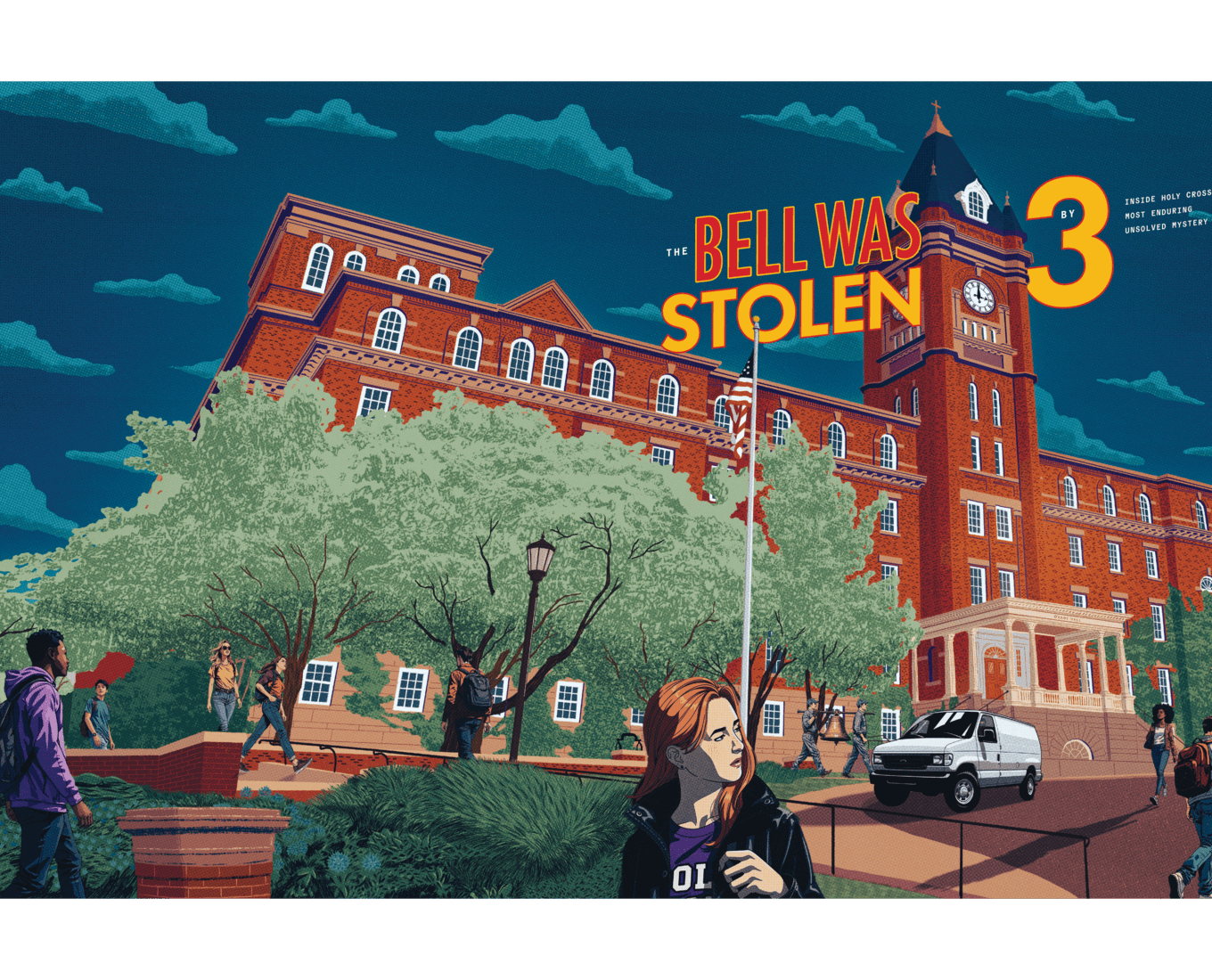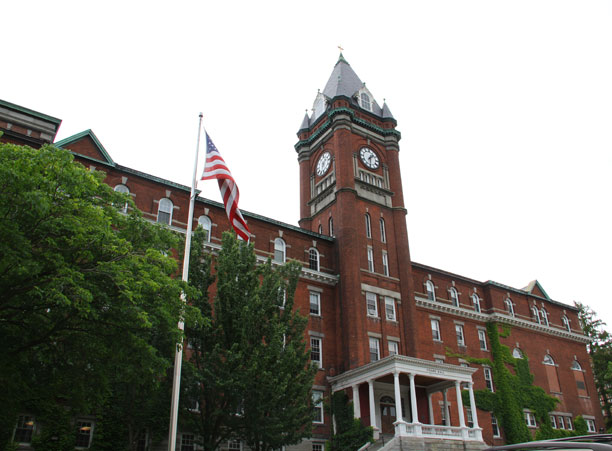
Since the beginning of the fall semester, the College of the Holy Cross community has been engaging with the upcoming presidential election in many ways, including through events, academic courses, and media. The College has held voter registration and absentee ballot drives, various lectures both in and out of the classroom, and even its own mock debates between students on campus.
See how Holy Cross has taken on the 2016 election below:
Campus Events
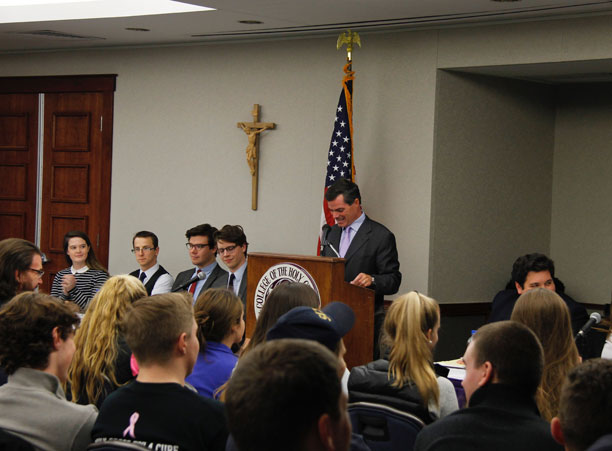 Peter Flaherty '87 moderates a mock debate between College Democrats and College Republicans on Oct. 26. Photo by Andrea Peraza Calderon '19
Peter Flaherty '87 moderates a mock debate between College Democrats and College Republicans on Oct. 26. Photo by Andrea Peraza Calderon '19Throughout the semester, Holy Cross faculty members, visiting professors, alumni and students have attended and participated in a variety of campus events. Past events include:
Oct. 27, Pros and Cons of a No-Fly or Safe Zone in Syria This discussion, which was facilitated by Vickie Langhor, chair of the political science department, addressed the pros, cons, and cost of creating no-fly or safe zones, and shed light on what American citizens can learn from historical examples, such as the safe zone in Bosnia in the 1990s and the no-fly zone over the Kurdish areas of Iraq between 1990 and 2003. This event was sponsored by the Dean's Office.
Oct. 26, Mock Presidential Debate The College Democrats and College Republicans participated in a mock presidential debate, moderated by Peter Flaherty '87, of the Shawmut Group consulting firm. This event was sponsored by SPUD, the Charles Carroll Program, and alumni relations.
Oct. 18, Backstage at the Presidential Debate: A Conversation With Peter Flaherty This event was hosted by the political science department.
Oct. 17, How Did Donald Trump Become the Republican Nominee? Donald Brand, professor of political science, discussed the primary process that led to the election of Donald Trump as the Republican nominee. This event was hosted by the Dean's Office.
Oct. 17, Race, Ethnic Identity, and Activism in the Presidential Elections and Beyond Hosted by Evelyn Simien, associate professor of political science and Africana Studies at the University of Connecticut; Peter Skerry, professor of political science at Boston College; and Chris Zepeda-Millan, assistant professor and chair of the Center for Research on Social Change, University of California at Berkeley discussed hot-button issues and key social and political trends, including black and Latina/o identity and new forms of activism. This event was co-sponsored by the political science department and the Charles Carroll Program.
Oct. 6, Does the Party Decide? What is the Role for Party Elites and Superdelegates? Hans Noel, associate professor of government at Georgetown University, and Elaine Kamarck, the author of "Primary Politics: How Presidential Candidates Have Shaped the Modern Nominating System" (Brookings Institution Press, 2009), discussed how party elites dominate the decision on who their party's presidential candidate should be, and how this assessment has held up during the 2016 election. This event was hosted by the political science department.
Sept. 21, The Economics of Immigration: Separating Fact from Rhetoric In a talk facilitated by Kolleen Rask, professor of economics, attendees explored how immigration became a central focal point in this presidential election cycle, and looked at the evidence in terms of jobs, wages, crime, social services, taxes, and budgets.
Sept. 16–30, Voter Registration The Office of Student Involvement made it easy for all qualified students to register to vote, completing and submitting their registration forms before the upcoming election.
Sept. 14, "I Alone Can Fix It": Donald Trump and the Constitutional Derangement of the Contemporary Republican Party To celebrate Constitution Day, Ken Kersch, professor of political science at Boston College, delivered the lecture "'I Alone Can Fix It': Donald Trump and the Constitutional Derangement of the Contemporary Republican Party." This event was co-sponsored by the Charles Carroll Program and the political science department.
Sept. 14, Kristin Heyer on Kinship with Migrants Hosted by the McFarland Center for Religion, Ethics and Culture, Kristin Heyer, professor of theology at Boston College, discussed her new book, Catholics' responsibilities to immigrants in light of the Pope's Year of Mercy, and the current political discourse.
In the Classroom
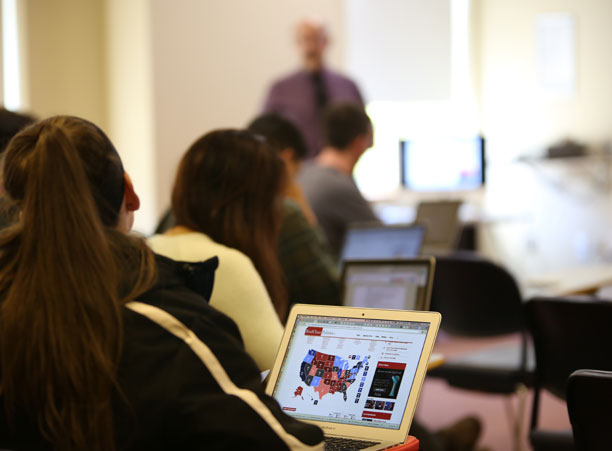
Only offered during election years, the “Presidential Selections” course taught by Donald Brand, professor of political science, invites students to examine how the United States selects its president, giving considerable attention to the current campaign, in addition to understanding campaigns within their institutional and historical contexts.
The class explores the contemporary presidential selection process and its many parts, including the presidential debates, media campaigns, and electoral college, as well as the major reforms of the presidential selection since the country’s founding. The course aims to enhance the political judgement of students and to introduce them to the complexity of the American political system.
The course is useful to students not only as students, but as young voters as well.
“Voting is a civic obligation, but it isn't very effective to preach to students that this is something they ought to do,” Brand says. “Unfortunately, young people have relatively low turnout rates, but this is in part because they have not yet developed the habit of voting. Voting is a habit: the more you do it, the more likely you are to do it in the future. To encourage young voters to develop this habit, I try to generate higher levels of interest and excitement about campaigns.”
Here's What Our Faculty Are Saying
In addition to engaging with the election through campus events, faculty experts at the College have offered commentary on numerous facets of the presidential race to local and national media.
In one Fortune op-ed, Brand comments on a moderator's fact-checking role following moderator Lester Holt's performance during the first presidential debate. In the piece, Brand cites experienced moderators who insist that a moderator's role should be left to the background, which would allow the candidates to remain at the foreground.
"If debate moderators succumb to the temptation to fact-check, their interventions in the debates automatically become part of the storyline," he wrote. "And when the media become part of the story, they cannot impartially tell the story."
"Even if he loses, Trump's candidacy has implications beyond this election cycle because of what it says about us as an electorate, and what we expect from our leaders," he wrote.
Other faculty experts have chimed in as well: Gregory Burnep, assistant professor of political science, defends maintaining the status quo of our divided government in U.S. News & World Report's op-ed section, "Debate Club;" Mathew Schmalz, associate professor of religious studies, offers a Christian perspective on the election in the Huffington Post and Boston Globe; and Edward O'Donnell, associate professor of history, provides commentary on Donald Trump's views on race in Fortune.
Selected Media Coverage
- U.S. News & World Report, Oct. 26: Should Government Be United or Divided in 2016?
- Huffington Post, Oct. 18: The Sins of Donald Trump
- Boston Globe, Oct. 17: A Christian Conservative Backlash Against Trump Seems to Be Building
- Fortune, Oct. 13: What Hillary Clinton's Lincoln Defense Got Wrong at the Debate
- U.S. News and World Report, Oct. 11: The Libertarian Collapse
- Fortune, Oct. 4: What Most Moderators Do Wrong During Presidential Debates
- Fortune, Sept. 24: What Trump's Candidacy Says About Voters' Expectations of U.S. Leaders
- U.S. News and World Report, Aug. 23: Trump Has Less Time Than He Thinks
- U.S. News and World Report, July 28: Who Had the Better Convention?
- U.S. News and World Report, June 28: Who Should Clinton Pick as Her Running Mate?
- Fortune, June 21: How Donald Trump's Nativism Ruined the GOP
- Fortune, June 8: How the Republican Party Can Avoid Death by Trump
- U.S. News and World Report, April 27: Why Bernie Could Still Win
The views expressed in these pieces are those of the author and not of the College of the Holy Cross.
